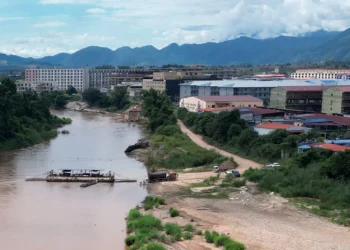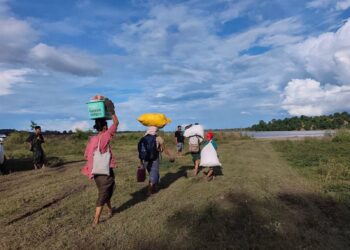More than two years into Myanmar’s post-coup conflict, the question of justice looms large. Certainly, it cannot be expected from the military regime, the main perpetrator of the almost daily atrocities across Myanmar and the instigator of the crisis itself. Instead, hope lies with the resistance. However, the questions of what crimes to punish and who to hold accountable need to be carefully considered if justice is not to turn into vindictiveness.
The military’s crimes are so outrageous that they demand accountability, but the resistance may be casting its net too widely in the search for culprits. In January the National Unity Consultative Council, the body coordinating resistance policy, issued a policy paper advocating that civil servants who went on strike to join the Civil Disobedience Movement should be rewarded when the revolution succeeds. More controversially, the paper states that government workers who have stayed in their jobs should be punished.
Civil servants in the CDM have made enormous sacrifices and are rightly regarded as heroes, so it is fair to honour them. But nobody should be punished for not being a hero. The policy seemingly ignores that many people are in an impossible situation; family commitments and economic hardship often leave them with little alternative to keeping their jobs and following regime orders. Tarring these people as villains could drive them into the arms of the junta, if only to seek protection, and will make reconciliation harder after the conflict.
It is also necessary to acknowledge that some members of the resistance are committing crimes, too. These certainly pale in comparison to those of the Tatmadaw and most of them would not have happened if the military had not thrown the country into chaos. But this doesn’t make them any less responsible for their actions.
The most notorious of these crimes is probably the gruesome killings of seven young people in Sagaing Region by a local armed group affiliated with the National Unity Government, the parallel administration set up by lawmakers ousted in the coup. There are conflicting accounts of the incident, but all agree that members of the armed group based in Chaung-U Township apprehended the victims in August last year when they were scavenging in a village recently raided by the military, allegedly raping some females in the group before the massacre.
The fighters were detained shortly after by the NUG-backed township administration body but released after one month. The NUG itself appears to have only heard about the case months later, in January this year, and it did not release a statement about it until May after some media reported on it. In the statement it called the killings unlawful and said it was “working to reveal the truth and to take legal actions”. But it is unclear what action, if any, has been taken against the perpetrators.
The slowness and inadequacy of this response is troubling because it undermines the NUG’s claim to offer a more humane alternative to military rule. Despite publishing a military code of conduct that states that “captives shall not be tortured and murdered”, the parallel government seemingly fails to enforce this code even when the most egregious breaches occur.
However, this may be less due to unwillingness than a straightforward lack of control over the troops it nominally commands. Although a highly mitigating factor, it is difficult for the NUG to admit to because it contradicts its claims of “effective control” over large swathes of Myanmar, which is key to its strategy of being recognised as the country’s legitimate government.
But while it lacks the military’s hard power, the NUG has the clear moral high ground among the Myanmar public and much of the international community. Its words carry huge weight and are keenly listened to by millions. It must therefore choose them carefully.
The Chaung-U killings were the actions of a rogue resistance group, but they took place amid a conflict where the military, and to some extent the resistance, have blurred the lines between combatants and civilians. The junta’s raising of local militias has muddied the situation, but many of the civil servants, military veterans and political party members assassinated by resistance groups would be considered civilians under international humanitarian law. Resistance groups often claim their victims have directly contributed to the arrest, torture and killing of their members, but there is little due process to establish the facts.
Although the NUG’s military code of conduct forbids attacks on civilians without qualification, its leaders have given tacit approval for these assassinations or simply dodged the issue. Asked about this by The Diplomat, Acting President Duwa Lashi La offered a vague excuse, saying most of the victims “are like spies of the military” who are “destroying our policy”.
The lack of clear red lines gives resistance groups licence to settle scores on the vaguest of pretexts and is particularly dangerous in such a decentralised movement. Some might argue that, while brutal, targeting the regime’s local minions will expedite its demise. But although the assassination campaign has led to some mass resignations of local officials, the practice also fuels a cycle of retributive violence that would be difficult to stop even after regime change. Frontier interviews with members of military families and veterans indicate that the assassinations have in fact tethered some people more closely to the military.
But for the NUG to exert more moral authority, it also needs to look inwards. Several of its members are from the National League for Democracy, whose time in government coincided with the military’s brutal “clearance operations” against the Rohingya in Rakhine State, in 2016 and 2017. While the constitution denied it any control over the armed forces, the NLD participated in the cover-up of the atrocities in Rakhine through an international campaign of denials.
In what appeared as a momentous break from these policies, the NUG announced in June 2021 that it would restore citizenship to the Rohingya, welcome back the refugees in Bangladesh and seek justice for them. Meanwhile, some members of the parallel government, which recently appointed a deputy minister from the minority group, have declared a change of heart. However, they have stopped short of acknowledging their complicity in what happened in Rakhine.
“In 2017, few of our people raised their voices against the military’s genocide of the Rohingya people. Past military regimes’ narratives about the Rohingya were deeply entrenched in society. The junta still rejects the very name Rohingya, but we have learned,” wrote the NUG Minister of Humanitarian Affairs and Disaster Management Dr Win Myat Aye.
From Win Myat Aye, these words are a deflection. As minister of social development, relief and resettlement in the NLD government, he accused the Rohingya of torching their own houses, despite overwhelming evidence that the military had done so, and oversaw the expropriation of the lands of those who fled to Bangladesh.
In addition, it is disingenuous to claim that the military deceived the NLD and wider public about the Rohingya. Successive military regimes have indeed tried to scapegoat the Muslim minority, but the results of the 2015 and 2020 elections and the reaction to the 2021 coup show Myanmar society is hardly in thrall to military propaganda. If people believed the military’s lies about the Rohingya, it was because they were more than ready to do so.
In any case, being hoodwinked by propaganda is not a valid excuse for complicity in crimes against humanity. If it were, those currently collaborating with the military regime could make the same argument.
Although a standout example, the events in Rakhine are one chapter in a more than seven-decade history of conflict across Myanmar, and justice is key to any attempt to break the cycle of violence. Overthrowing the military alone will not achieve this aim.
There are no easy formulas, but for real justice to be made, no victims can be forgotten and careful distinctions must be made between degrees of culpability. Direct involvement in atrocities should be punished, but political affiliation by itself should not be. And perhaps above all, a full reckoning over past crimes is required to build a new Myanmar.
SOURCE – FRONTIER






